Top 10 Interesting Facts about Indian Foods
Indian cuisine is a tapestry of flavors, colors, and traditions that has captivated food enthusiasts worldwide. Exploring the culinary landscape of India ... read more...reveals a treasure trove of interesting facts about Indian foods that shed light on the diversity and depth of this extraordinary cuisine. From the rich influence of spices to the vibrant street food culture, here are some intriguing and mouthwatering facts about Indian foods.
-
One of the interesting facts about Indian foods is that they are famous worldwide for their lavish use of spices. These aromatic and flavorful additions are the heart and soul of Indian cooking. India boasts an impressive array of spices, with over 30 commonly used varieties. They include coriander, cumin, turmeric, cardamom, cinnamon, and fenugreek, among others.
Spices are not just for heat; they lend depth, complexity, and richness to dishes. They can be dry-roasted to release their full flavor, ground into powders, or infused into hot oils for tempering. The spice blends, or masalas, are the magic behind iconic Indian dishes like curry. Each region in India has its own unique spice combinations, leading to an incredible diversity of flavors.
These spices are integral to Indian culture, influencing everything from daily meals to special occasions. They also offer numerous health benefits, from aiding digestion to having antioxidant properties. Indian cuisine's vibrant use of spices is a testament to its rich culinary heritage and enduring appeal.
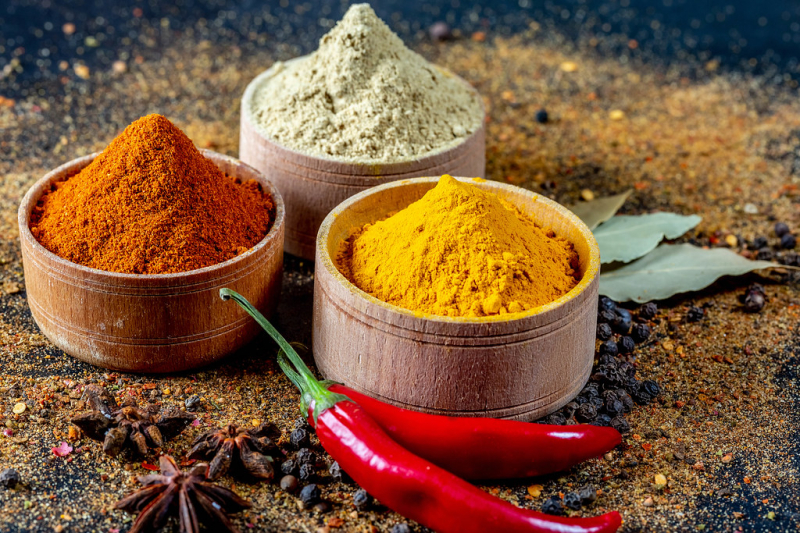
Image by Marco Verch Profession from Flickr (https://www.flickr.com/photos/30478819@N08/46872816621) Video by National Geographic India -
That India stands as one of the world's largest consumers of vegetarian food, a distinction deeply ingrained in its culture and traditions, is also one of the interesting facts about Indian foods. India's culinary heritage boasts a treasure trove of vegetarian delights, from flavorful curries and dals to an array of flatbreads and dairy-based dishes. This diversity stems from regional variations and the skillful use of aromatic spices.
Moreover, the prevalence of vegetarianism in India can be attributed to various factors, including religious beliefs, cultural practices, and historical influences. Hinduism, Buddhism, and Jainism, major religions in India, advocate for vegetarianism, with many considering it a path to spiritual purity. Numerous religious festivals and fasting rituals further promote vegetarian dietary choices.
The economic accessibility of vegetarian options, combined with a heightened awareness of the health and environmental benefits of plant-based diets, contributes to India's enduring love affair with vegetarian cuisine. In a world where dietary preferences vary widely, India's commitment to vegetarian food remains both unique and influential.
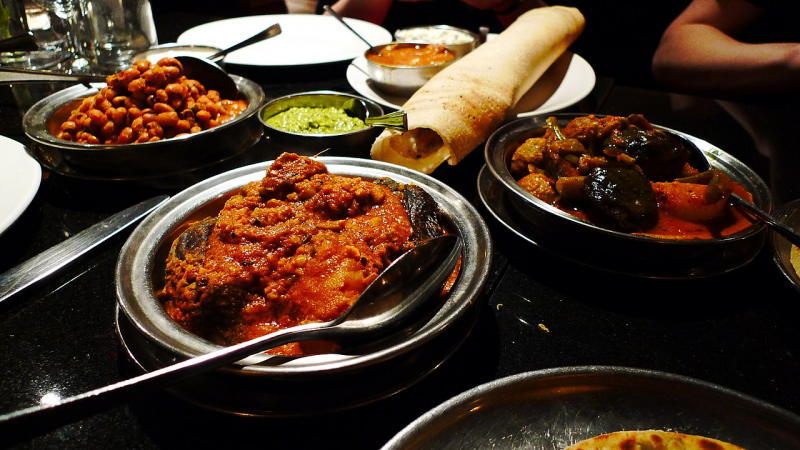
Image from Wikimedia Commons (https://commons.wikimedia.org/wiki/File:Rani_Vegetarian,_Finchley,_London_%283350424818%29.jpg) Video by Veggie Recipe House -
Roti, naan, and paratha are the quintessential breads in Indian cuisine, serving as fundamental accompaniments to a wide array of dishes. These unleavened and sometimes flaky bread types are more than just staples; they are integral to the Indian dining experience.
Roti, a simple and round flatbread, is made from whole wheat flour. It's a daily dietary essential for many Indians. Its mild flavor and soft texture make it an ideal vehicle for scooping up curries and vegetables.
Naan, on the other hand, is a leavened bread, typically cooked in a tandoor (clay oven). It's slightly thicker and fluffier than roti and is often brushed with ghee or butter. Naan is a versatile accompaniment, great for sopping up gravies or serving as a base for kebabs and tandoori dishes.
Paratha, a beloved breakfast and snack option, is a layered and flaky bread. Parathas can be stuffed with various fillings, such as spiced potatoes, paneer, or lentils, adding both texture and flavor.
These bread varieties, one of the interesting facts about Indian foods, reflect the diversity and richness of Indian cuisine. Whether you're savoring the simplicity of roti, the indulgence of naan, or the savory delight of paratha, these breads are the edible vessels that carry the vibrant flavors of India to your palate.
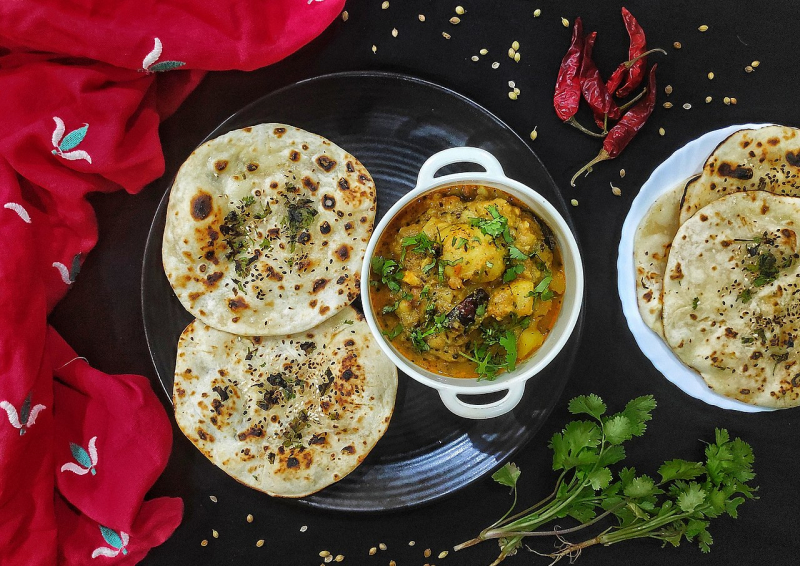
Image from Wikimedia Commons (https://commons.wikimedia.org/wiki/File:Tandoori_roti_with_aloo_ki_sabzi_Rayagada_Odisha_0005.jpg) Video by Hebbars Kitchen -
Yogurt, often referred to as "curd" in India, is a ubiquitous and cherished ingredient in Indian cuisine. Its versatility and cooling properties make it an essential component in a wide range of dishes.
One of the most well-known yogurt-based dishes is Raita, a side dish that mixes yogurt with various ingredients like cucumber, tomatoes, mint, and spices. Raita's refreshing taste provides balance to spicy Indian curries.
Yogurt acts as a natural tenderizer and flavor enhancer in Marinades for meats and vegetables. Chicken tikka, for instance, is marinated in yogurt and spices before being grilled, creating a succulent and flavorful dish. In some regions, a simple meal of rice and yogurt, known as "dahi chawal," is a comforting and wholesome dish enjoyed regularly.
Yogurt is often used to thicken and add a creamy texture to Indian curries. Dishes like butter chicken and chicken korma owe their rich, velvety sauces to yogurt.In sweets like Shrikhand and Lassi, yogurt takes center stage. Shrikhand is a sweet, spiced yogurt dessert, while Lassi is a yogurt-based drink, often flavored with fruit or spices and enjoyed as a refreshing beverage.
Yogurt's role in Indian cuisine is not just culinary but also functional, as it aids in digestion and cools the palate, making it an indispensable and beloved ingredient in the diverse tapestry of Indian flavors.
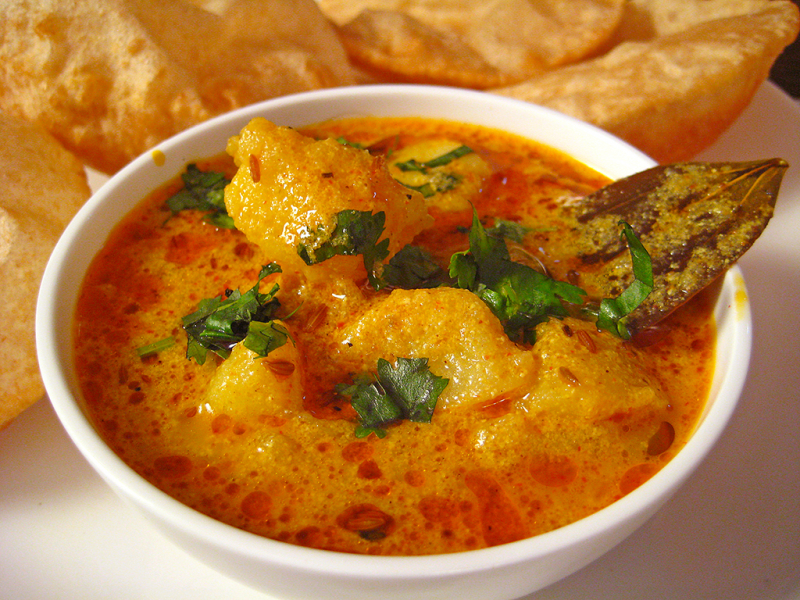
Image by Soniya Goyal from Flickr (https://www.flickr.com/photos/soniagoyal/28906445485) Video by Kitchen Sanctuary -
India's street food culture is a vibrant and diverse tapestry of flavors, aromas, and culinary experiences that unfold in the bustling streets and markets across the country. It's a dynamic showcase of regional specialties and age-old recipes, each with its own unique charm.
From the spicy tang of chaat, a medley of crispy snacks drenched in chutneys, to the comforting warmth of pav bhaji, a hearty vegetable curry served with buttered buns, the options are endless. Vada pav, often called the "Indian burger", boasts a deep-fried potato patty served in a bun, while dosa vendors expertly craft thin, crispy pancakes stuffed with various fillings.
For those craving sweets, there's jalebi, a syrup-soaked spiral of fried dough, and kulfi, India's answer to ice cream, in flavors like pistachio and rose. Street food vendors in India embody the spirit of Indian street cuisine. They offer not just sustenance but a sensory journey through India's rich culinary traditions, making street food culture an indispensable part of the nation's food landscape.
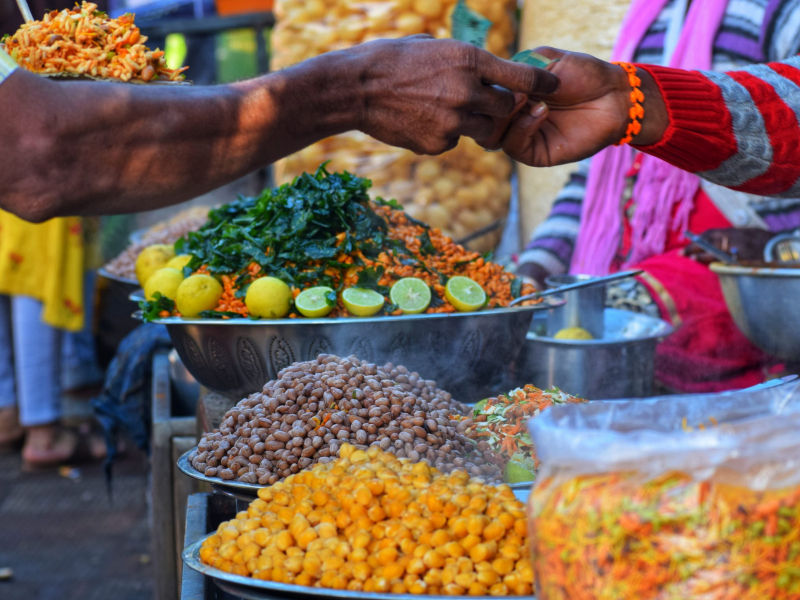
Image by Soorajc from PixaHive (https://pixahive.com/photo/streetfood/) Video by Indian Food Explorer -
Number six on the list of interesting facts about Indian foods is that they have undeniably left a profound and enduring mark on global cooking. Its influence can be observed in various aspects of culinary traditions worldwide.
Indian cuisine's expert use of spices and herbs has inspired chefs around the globe. Many iconic dishes, from curries to spice blends like curry powder, owe their existence to Indian foods. The popularity of spices like turmeric, cumin, and coriander has transcended borders. The rich variety of vegetarian and vegan dishes in Indian cuisine has also contributed to the global appreciation of plant-based diets.
Tandoori cooking, characterized by the use of clay ovens or tandoors, has inspired dishes like tandoori chicken and kebabs, which are now beloved in many countries. Moreover, the fusion of Indian flavors with other culinary traditions has led to the creation of exciting new dishes. Indian-Chinese cuisine, for example, combines Indian spices with Chinese cooking techniques.
Indian cuisine's influence on global cooking is a testament to its rich history, diverse regional traditions, and the enduring appeal of its flavors and techniques. It has not only enriched the world's culinary landscape but also fostered cross-cultural appreciation and exploration of food.
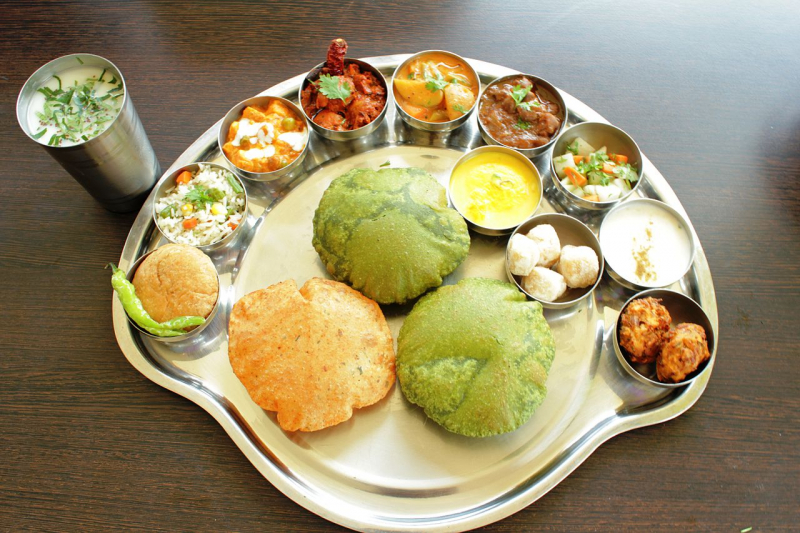
Image from Wikimedia Commons (https://commons.wikimedia.org/wiki/File:Indian_-_Food.jpg) Video by WION -
Indian cuisine carries the profound influence of Ayurveda, an ancient system of medicine that has shaped not only the flavors but also the health-conscious philosophy of Indian cooking. Ayurveda, which dates back over 5,000 years, emphasizes a holistic approach to well-being, focusing on the balance of mind, body, and spirit.
In Ayurvedic cooking, food is not merely sustenance; it is medicine. Ingredients are chosen not only for their flavor but also for their therapeutic properties. Spices like turmeric, known for its anti-inflammatory qualities, and ginger, used to aid digestion, play pivotal roles in Indian dishes.
The concept of balancing doshas, or bodily energies, is central to Ayurveda and finds expression in cuisine. Meals are thoughtfully prepared to harmonize these energies. For example, cooling foods like cucumber and mint are favored during hot seasons, while warming spices like cinnamon and cloves are used in colder months.
Indian cuisine's alignment with Ayurvedic principles not only contributes to its depth of flavor but also underscores its profound connection to well-being, making it a culinary tradition that nourishes not only the body but also the soul.
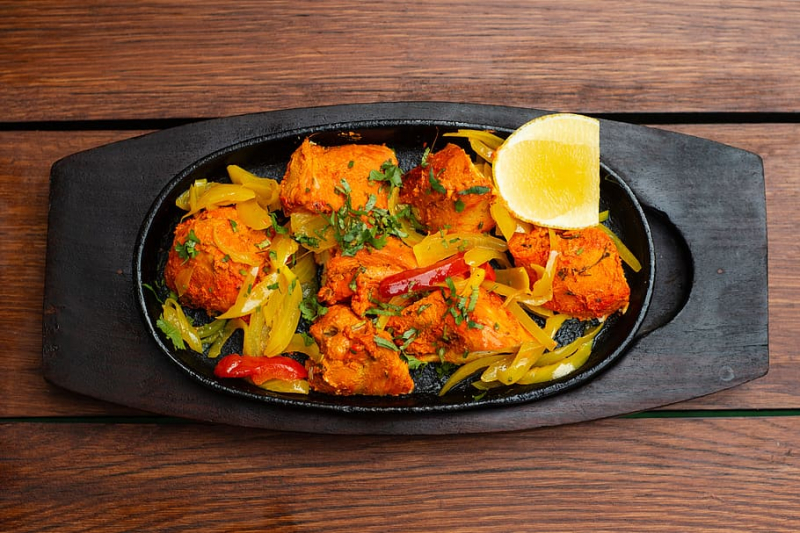
Image from https://www.wallpaperflare.com/tandoori-chicken-tikka-indian-food-indian-kitchen-meal-wallpaper-afrkf Video by Skinny Recipes -
India is renowned for its vibrant and deeply ingrained chai (tea) culture, a tradition that has transcended generations and social boundaries. Chai is more than just a beverage; it's a way of life, a daily ritual, and a symbol of hospitality.
Indian chai is a unique blend of black tea leaves, milk, sugar, and an assortment of aromatic spices like cardamom, cinnamon, cloves, and ginger. The result is a fragrant and invigorating brew.
Street vendors, known as chaiwalas, are an integral part of Indian cities and towns. They prepare and serve chai with expertise, catering to locals and travelers alike. It is often accompanied by delectable snacks like samosas, pakoras, and biscuits to enhance the overall experience.
Chai transcends social and economic divides, providing a common ground for people to come together. Whether it's a family gathering, a business meeting, or a roadside chat, chai fosters connections. Each region in India offers its own unique take on chai, from the spiced masala chai of North India to the strong and aromatic chai of South India.
India's chai culture reflects its warmth, diversity, and timeless charm of sipping a steaming cup of tea while engaging in conversations, making it an integral part of the nation's identity.

Image from https://www.wallpaperflare.com/chai-latter-masala-coffee-shop-indian-drink-beverage-steamed-milk-wallpaper-akclu Video by Food with Chetna -
Indian cuisine is renowned for its diverse array of pickles, often referred to as "achar." These pickles are a delicious and essential component of Indian dining, offering bursts of flavor and a spicy kick to meals.
The mango pickle is perhaps the most iconic of all Indian pickles. Made from raw mangoes, it's known for its sweet, tangy, and spicy flavor. The combination of mangoes, spices, and oil creates a delightful condiment that pairs perfectly with rice, bread, or as a side to various Indian dishes.
Next, lemon pickles in Indian foods are another beloved variety. Sliced lemons are marinated in a mixture of spices, salt, and oil. The result is a zesty and tangy pickle that adds zest to any meal.
Last but not least, mixed vegetable pickle is a medley of various vegetables like carrots, cauliflower, and green chilies soaked in a spicy and tangy brine. A mixed vegetable pickle offers a delightful crunch and a harmonious blend of flavors.
Indian foods are not just condiments but also a reflection of regional flavors and traditions. The art of pickling has been passed down through generations, and every household may have its own secret recipe. Indian pickles are an essential and much-loved part of the country's culinary heritage.
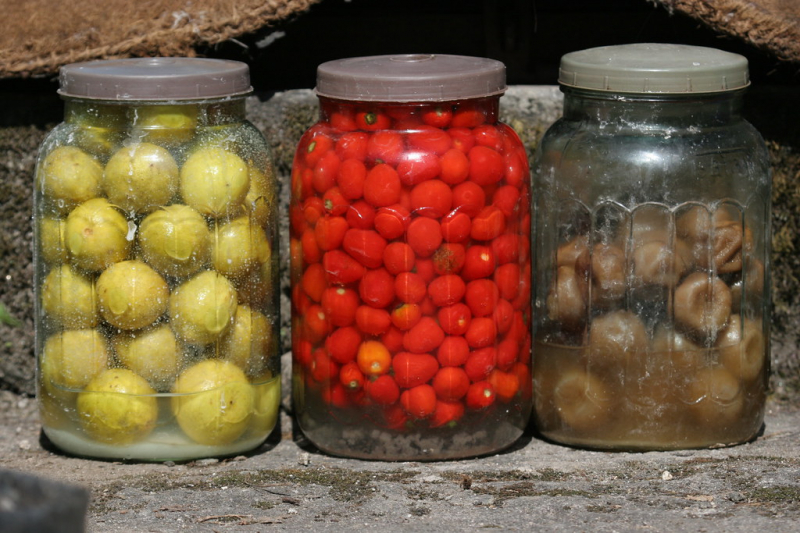
Image by ...your local connection from Flickr (https://www.flickr.com/photos/whltravel/5664816717) Video by HomeCookingShow -
The tandoor, a traditional clay oven, holds a special place in Indian cuisine. It is typically made from clay and is cylindrical in shape. The walls of the tandoor can reach extremely high temperatures, allowing for quick and even cooking. It's a versatile cooking tool that imparts a unique smoky flavor and tenderness to a variety of dishes.
Tandoors in Indian foods are used for cooking an array of dishes, from bread to meats and vegetables. Naan, a soft and fluffy Indian bread, is a staple cooked in the tandoor. The dough is slapped onto the oven's inner walls, where it puffs up and becomes deliciously charred and smoky.
Meats like chicken, lamb, and fish are marinated in a mixture of yogurt and spices, then skewered and cooked in the tandoor. The intense heat of the tandoor sears the meat, creating a flavorful, slightly charred exterior while keeping the inside juicy and tender.
The tandoor not only adds a unique dimension to Indian foods but also symbolizes the rich culinary traditions of the country. Its versatility and ability to infuse dishes with a smoky, earthy essence make it an indispensable tool in Indian kitchens and a celebrated aspect of Indian cuisine.
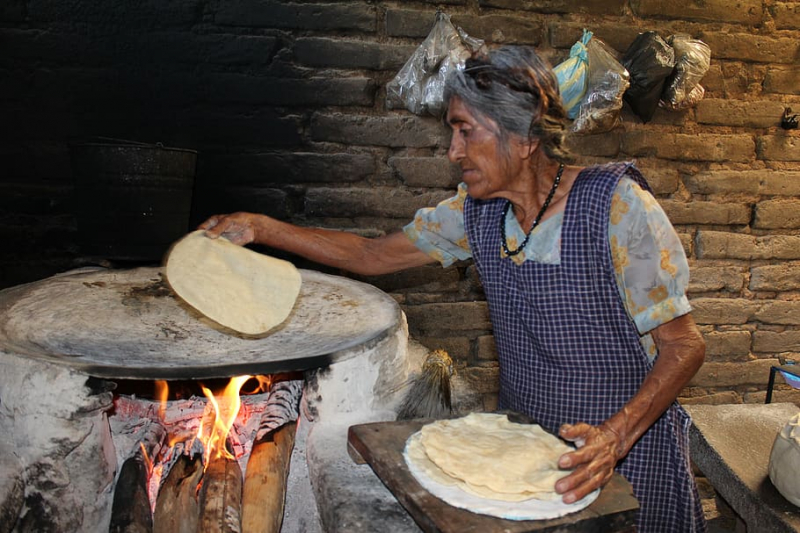
Image from https://www.wallpaperflare.com/women-poverty-tori-indian-mexico-oaxaca-chatina-traditional-clothes-wallpaper-gbfda Video by FoodyTrip 푸디트립































